JD Vance’s Slanders Are Far From the Worst Thing the US Has Done to Haitians
After years of strenuously ignoring the country’s agony, Secretary of State Antony Blinken finally visited Haiti last week. For five hours.
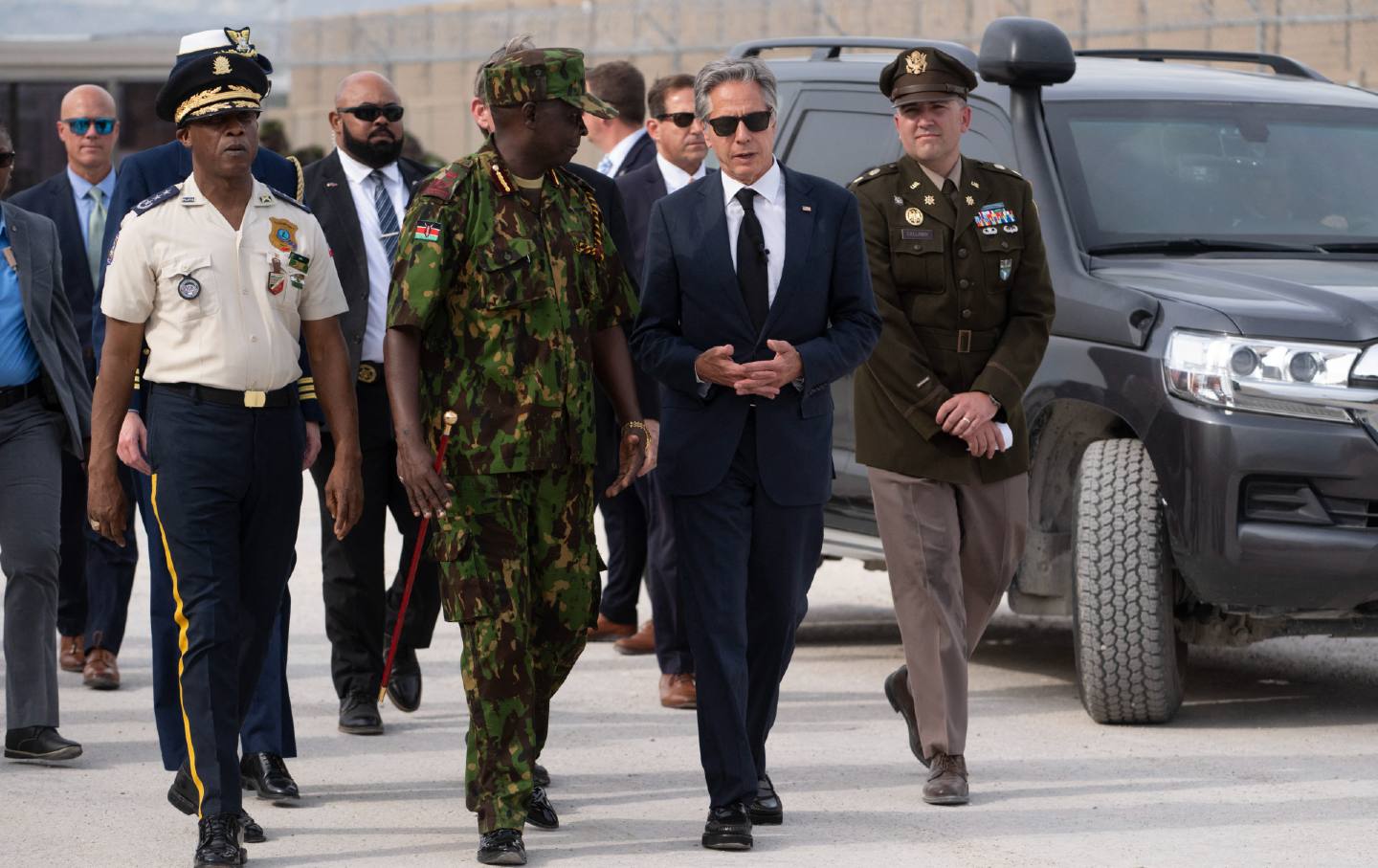
It took a lot of unearned courage—some might call it chutzpah, or even balls—for Secretary of State Antony Blinken to fly down to Haiti, arguably the biggest mess US foreign policy has created anywhere in the world (though there are many contenders for that position), merely to reassert the administration’s commitment to the still-evolving government there. Yet Blinken’s lightning visit last week could nonetheless be considered a success. Nothing bad happened; another $45 million in US humanitarian assistance was promised.
Blinken is the highest-ranking American official to visit the country since 2015. Though the US policy in Haiti since the fall of the Duvalier dynasty in 1986 has been to establish a secure electoral democracy in the island nation, there has not been an election of any kind there since 2016—after which the two governments that the United States maneuvered into office failed ever to hold a vote.
The current prime minister, Garry Conille, is the latest in the series of US-backed leaders. He took over in June from the criminally negligent, impotent, overlong reign of the unelected Prime Minister Ariel Henry, who was finally hustled out of Haiti during a gang uprising this past spring and then was not permitted to return to Haitian territory.
One of the hallmarks of US policy in Haiti over the years has been to make demands that create conditions for future political failure, and then blame Haitian dysfunction for that inevitable collapse. Yet it is that very policy that encourages that dysfunction. Conille’s racketty-packetty house of a government, stuffed with rivalrous Haitian political factions essentially imposed on Haiti by the US and CARICOM (the 20-nation Caribbean economic coalition), has shown itself so far incapable of arriving at consensus, much less of leading the country to elections. Even within the factions represented, there are unbreachable fissures.
In spite of this very open fractiousness, and with the trademark casual American refusal to recognize real Haitian problems, Blinken told reporters in Port-au-Prince last week that the US “appreciates Haiti’s leaders putting aside their differences working together to put the country on a path for free and fair elections.” Meanwhile, Conille’s bifurcated government hobbles on, crippled for now by internecine squabbling over power—as could have been (and, in fact, was) predicted.
While the government squabbles, the country’s forces of order have tried to calm the streets. But power no longer resides with them; it hasn’t since the quasi-occupation of Haiti in 2004 by the United Nations mission there, which comprised some 5000 military officers and civilian staff and advisers. Neither the Haitian National Police, nor the small, rather ragtag Haitian Army, nor the painfully undermanned replacement for the UN occupation—a 400-person Kenyan police detail sent in to deal with Haiti’s security problems—seems capable of countering the volatile and violent gangs that now rule the Haitian capital, making the chance of free or fair elections slim indeed. Still, under Conille the Haitian police—fortified recently by a shipment to the Kenyan force of 24 armored vehicles from the US—have at least begun to engage with the gangs, and have even managed to claw back some small areas of the capital from their grasp.
Conille himself had to show up to receive Blinken: the United States is still Haiti’s “best friend” in terms of humanitarian aid and other support, but Haiti’s status as a test tube for ruinous US experiments in democracy is not gaining the Americans any popularity, and Conille did not make a big occasion out of the visit. Neither did Blinken, who traveled through Port-au-Prince via convoys of armored cars from one location secured by US forces to another. A five-hour visit, from landing to takeoff.
With more than 300,000 Haitians, including thousands of babies and children, still displaced by the 2010 earthquake and years of intensifying gang activity, and living in total precarity— no sanitation, clean water, or healthcare; vast food insecurity; and often without work, shelter, or school—Haitians from the top of the social ladder to the bottom feel as if all the US money that’s gone into stabilizing the country in recent years has been wasted. Or, as Haitians say, “it’s like throwing water on the sand.” In 2023 alone, the US provided Haiti with $380 million in financial assistance—not an unusual figure for the perpetually strapped country. In the decade after the earthquake, the international community as a whole furnished some $13 billion in aid.
But there is no sign that over the many decades of assistance the Haitian people have moved forward economically. Instead many Haitians—and most foreign economic analysts—believe that much of this aid has gone to reinforce and enrich corrupt governments and their business friends, rather than to provide social programs and development for the population. Several of these friends were also darlings of Bill and Hillary Clinton, and benefited from their valuable support.
The Biden administration’s policy of forcible deportation of Haitian refugees from US borders back to Port-au-Prince—more than 20,000 during his administration—has also not won the US president many admirers in Haiti, especially given the administration’s July 2023 decision to begin evacuating families of American personnel because of ongoing insecurity.
“Do not travel to Haiti due to kidnapping, crime, civil unrest, and poor health care infrastructure,” read the travel advisory from the State Department. “US citizens in Haiti should depart Haiti as soon as possible by commercial or other privately available transportation options, in light of the current security situation and infrastructure challenges.” At the time, private helicopters were landing regularly on hilltops to ferry US citizens and Haitians with money and travel papers to either the neighboring Dominican Republic or to Miami, while the State Department haggled with Haitian groups about how to help the country out of its quagmire.
Beyond the failure of its aid program and its political policies, the United States is also reviled for supporting the 13-year UN occupation that only ended in 2017. “The Blinken visit is just a repeat of the traditional American playbook,” says Daniel Foote, former US special envoy to Haiti:
“Three years ago, the Department of State disavowed any desire for another UN peacekeeping mission, apparently acknowledging the fact that Haitians despise UN operations because of past atrocities, massacres, and sexual exploitation of women and children. Plus [the UN force] reintroduced cholera into the country 120 years after it was originally eradicated. Now the US is going for another military intervention [the Kenyan police] that’s not been requested by anyone but the US puppets. The irony: Secretary Blinken does all this while saying the plan is Haitian-led.”
If the US record were not so terrible in Latin America generally, it would be astonishing how backward and destructive the economic and political attitude of the world’s richest, best-armed superpower has been toward this desperate neighbor. After all, throughout its history Haiti has remained reasonably friendly toward the United States: no popular front, no powerful Communist or socialist party, a weak and fractured left, with much of its potential for resistance destroyed at conception by the US Marines’ occupation of the country from 1915 to 1934.
When the murderous Duvalier dynasty fell from power in 1986, Ronald Reagan was in the White house, and Haiti has been one of the prime victims of the US’s long Reagan hangover. His administration hoped that the military-civilian junta they supported after Duvalier’s departure would ensure that Haiti’s multigenerational economic elite and the country’s political class—so welcoming of long-entrenched US business interests and of the American government—would continue to run the country, only now without the obstacles that the corrupt Duvaliers had been putting in their way.
Members of those business-inclined elites—blessed, as Duvalier fell, by Reagan’s foreign policy circles—were repeatedly summoned to negotiating tables by US diplomats in the ensuing years. Until recently they were also still running the country as a balkanized series of corrupt fiefdoms, deploying gang firepower and coercion when necessary. The dead hand of Reaganomics in Haiti also kept the state extremely weak, leaving this same coddled elite and its minions in charge of services that in many other places would have been nationalized: transport, communications, energy, healthcare, water delivery, and education. Even the lottery was in private hands. In economic spaces where profit was not high enough—for example, clinics and schools in the countryside—international nongovernmental organizations (NGOs), mostly religious charities, arrived to provide a limited version of service that the Haitian government could not provide, or would not. Haiti is Reagan’s dream made flesh: an economy almost completely run by the private sector, with no regulation.
But now the gangs that this same elite traditionally manipulated for political and business ends have apparently escaped from its control. Equipped with military-style weapons and ammunition brought in clandestinely through Miami’s ports, these groups have morphed into seemingly independent criminal enterprises and drug-trafficking rings that, while still sometimes useful to what Haitians call the county’s “biznis mafya,” can no longer be relied on to obey that mafia’s every command.
These same gangs now run almost all of Port-au-Prince—and are spreading their reigns of terror into the nearby countryside. Already this year, more than 4,000 Haitians have been killed or injured in gang violence. Tens of thousands have been displaced from their homes, all of which are systematically looted, and often burned. Women have been attacked both in gang-run areas, where many have been forced into what amounts to sexual servitude and enforced gang participation, and in neighborhoods under assault, where gang rape is common as a tool of control. Schools have been closed, hospitals attacked, looted, and burned, churches targeted, and barely a police headquarters in the capital or its environs has been left untouched by arson and looting. Several of the country’s largest prisons, redoubts of starvation and criminality themselves, have been destroyed and their populations released into the streets, some to starve further, others to rejoin the gangs.
Only one hospital in all of Port-au-Prince—l’Hôpital Universitaire de la Paix—can be called functional. Medical supplies have been commandeered by the gangs, as has gasoline. Extortionist tolls are exacted from bus drivers and passengers and from individual drivers at important crossroads leading in and out of Port-au-Prince. The highways around the country are places of banditry and death where hardly anyone ventures. The ubiquitous market women who come down from the countryside to sell in the cities’ markets—the picturesque lifeblood of Haitian commerce—are under constant threat of robbery and physical attack. “The gangs,” said Monique Clesca, a Haitian political activist, “are waging a war against the population.”
Popular
“swipe left below to view more authors”Swipe →All of this terror was boiling and churning in recent years, as Washington vacillated and hemmed and hawed and turned away from reasonable Haitian interlocutors, engaging instead with the usual suspects it had always trusted and could never seemingly do without. American and other international negotiators put off new democratic groups, with new ideas about grassroots control of the country and real democratic rule, and rejected their proposals pretty much wholesale, while the old guard plotted and planned.
Whatever else the Haitians and Americans are now each cooking up, the brief passage of Blinken through the Haitian landscape means at least that the US hasn’t turned away from the crisis, even if so far it has been inept at helping to solve it. You may mistrust the motivations behind your friend’s offers of help, but still, you don’t want him to abandon you. From the administration’s point of view, continuing US support of Conille and the Kenyan force may help ensure that the Haitian situation doesn’t deteriorate further, at least in the immediate future, i.e., before the November 5 elections. The last thing the Democratic Party wants to see are boatloads of Haitians arriving on Florida’s shores during the next few months.
Conille is probably the right man for this moment: clear-eyed, familiar with the international complex (he worked for the UN in various capacities from 2001 on, including in Haiti after the earthquake), able to talk as an equal with Blinken, but also connected through family to both the Haitian elite and to the small but still important middle class. Slow to anger and with a reputation for loyalty toward his underlings rather than dramatic firings and hirings, Conille has so far been free from the usual, and often well-founded, accusations of corruption… or drug-trafficking…. or participation in gang massacres…. or looting of government coffers that have been leveled against many of his predecessors.
In the wings, the threat of Trump looms. He’s long put Haiti into his infamous category of “shithole countries,” while just this week his running mate JD Vance accused “illegal Haitian immigrants” of “draining social services and generally causing chaos all over Springfield, Ohio.” Vance also accused the Haitians of abducting and eating their neighbors’ household pets. Such talk does not bode well for Haitian immigrants—or for the country’s limping attempts to get out from under the gangs and move toward democratic governance.
When people ask how Haiti can be “like that” when it is so close to the US, the proper response is that it’s “like that” precisely because it is so close to the US.
More from Amy Wilentz
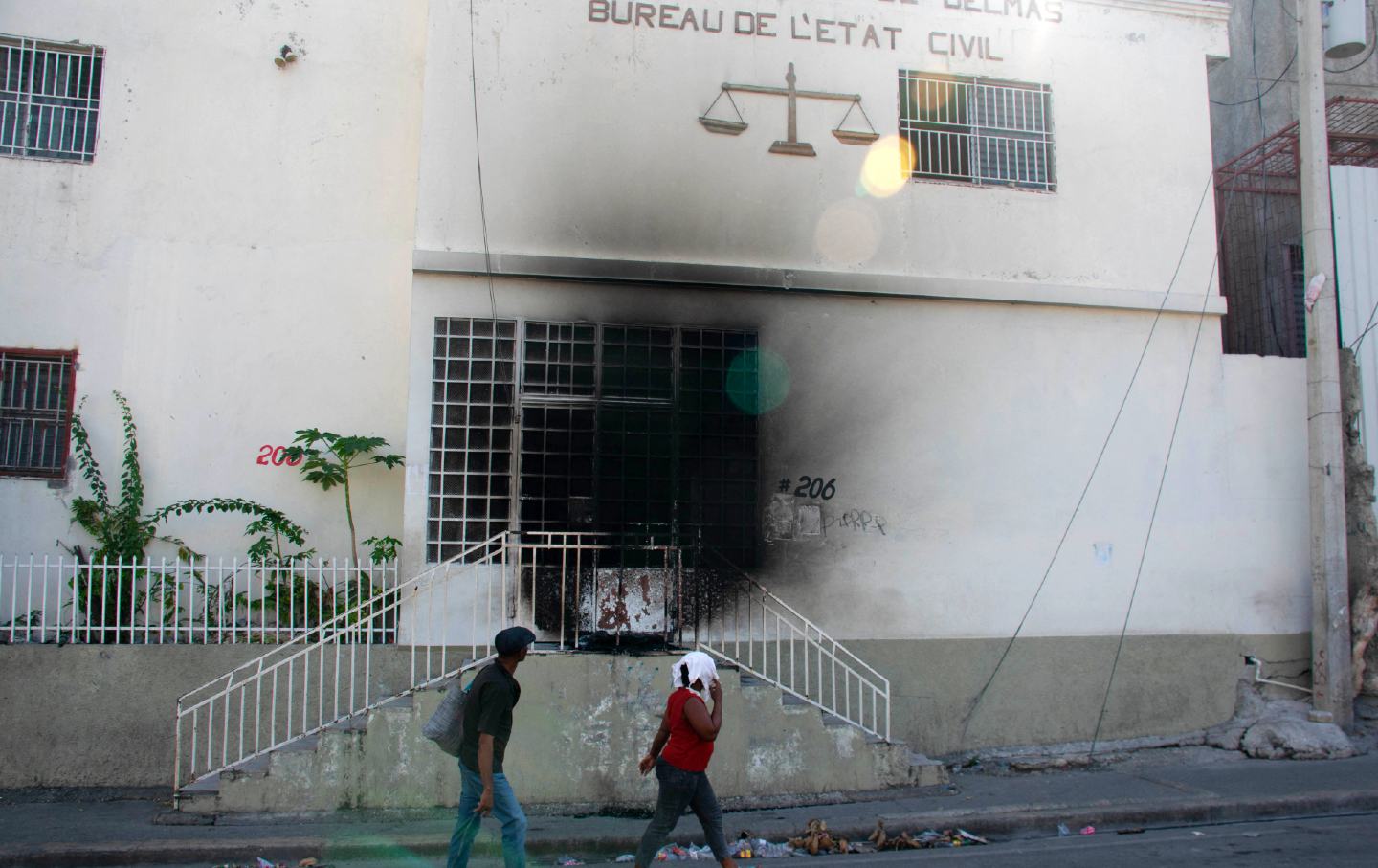
Haiti’s Hour of Deliverance or Despair Haiti’s Hour of Deliverance or Despair
Gangs assert their patriotism while the latest international rescue plan teeters between failure and a possible way forward.
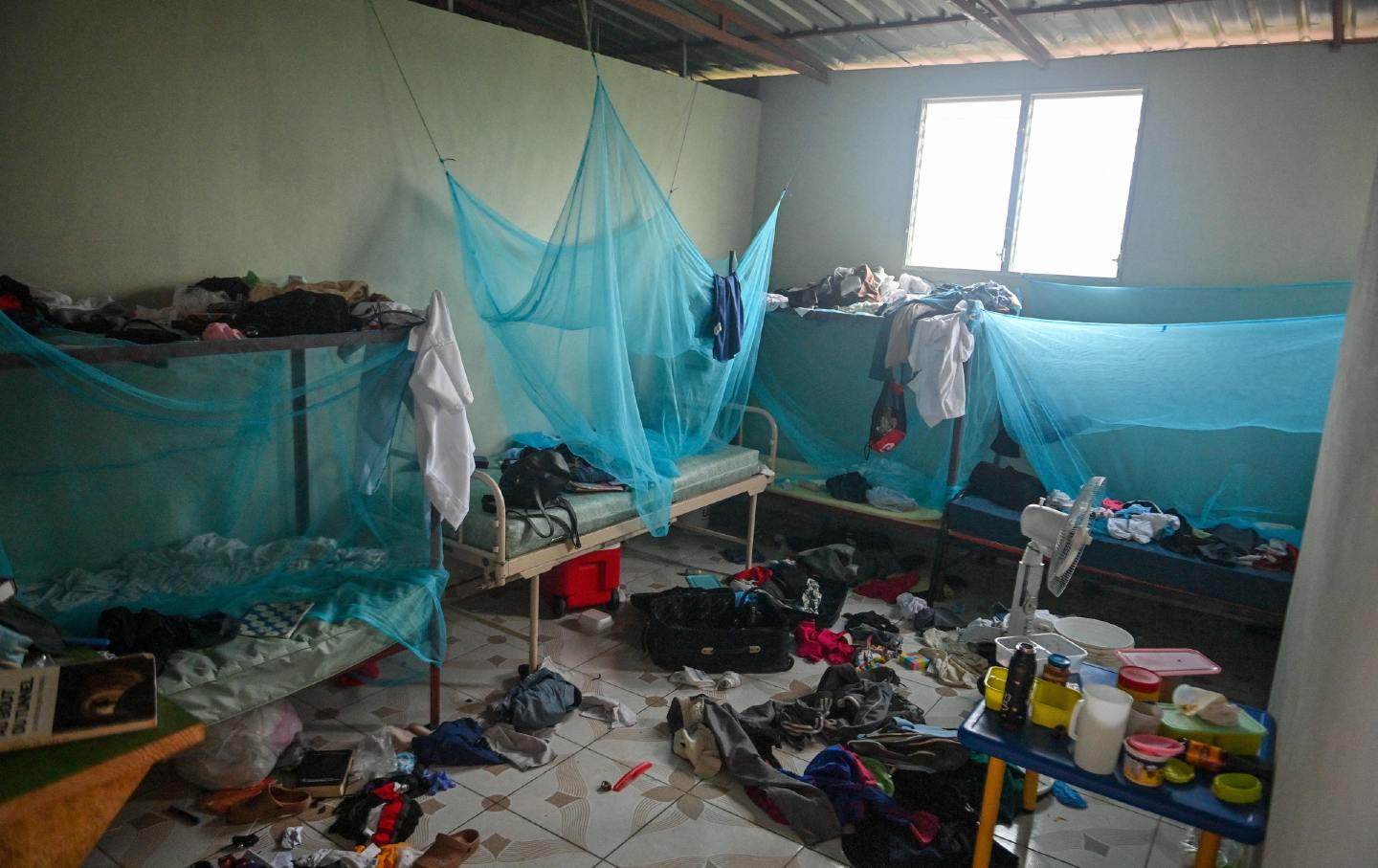
Why Is the US Paying Kenya to Clean Up the Mess We Made in Haiti? Why Is the US Paying Kenya to Clean Up the Mess We Made in Haiti?
The Biden administration likes to talk about democracy, but when it comes to the disaster unfolding a few hundred miles from Miami, democracy is apparently far too dangerous.

In Gaza They Don’t Even Bother to Call It Peace In Gaza They Don’t Even Bother to Call It Peace
For Netanyahu, as for Hamas, the life of a child born into the opposing “nation” has no value.
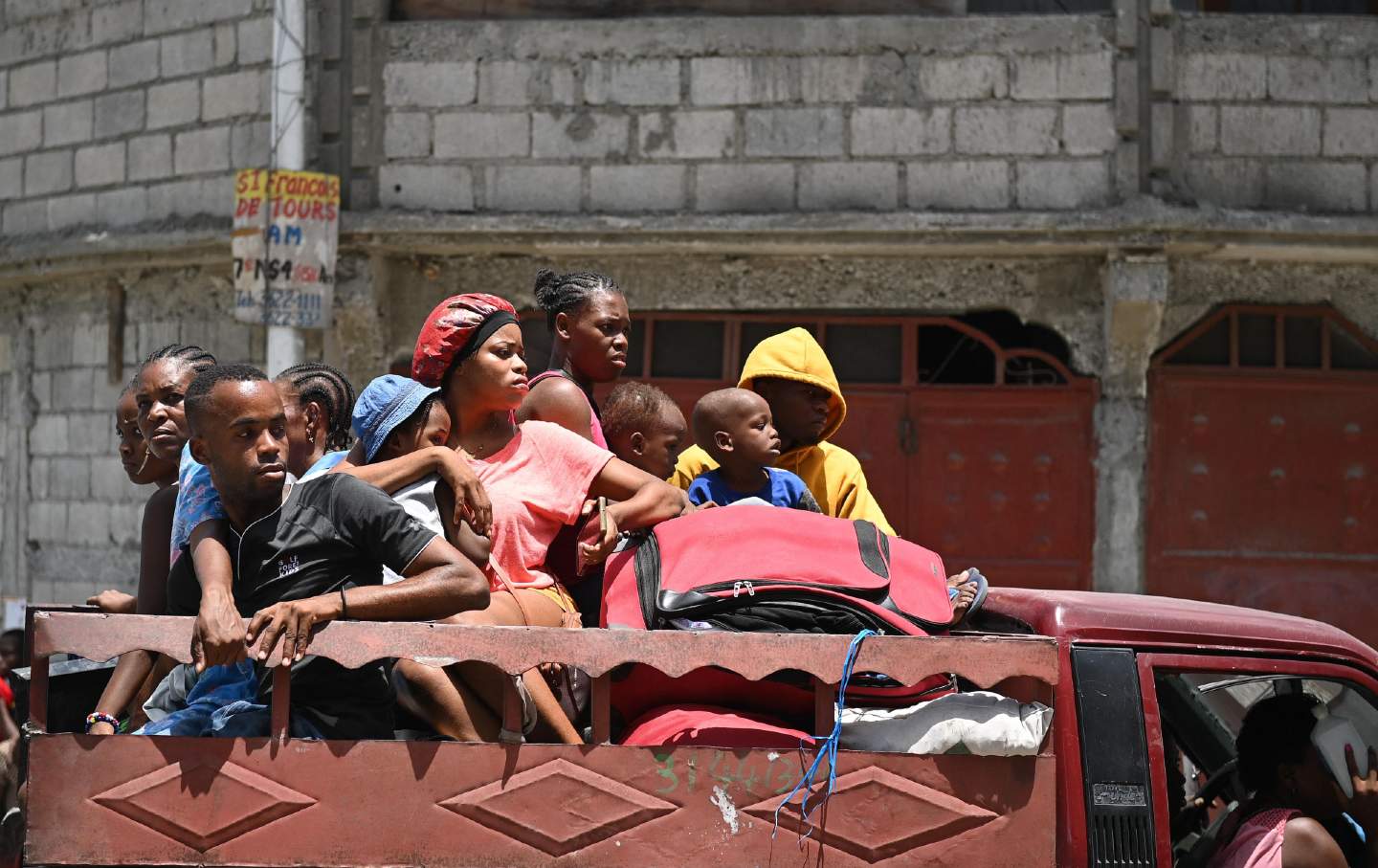
The Biden Administration Cuts and Runs From Haiti The Biden Administration Cuts and Runs From Haiti
After more than a century bleeding the country, installing and abetting corrupt dictators, and suppressing democracy, the US government now advises Americans to flee.
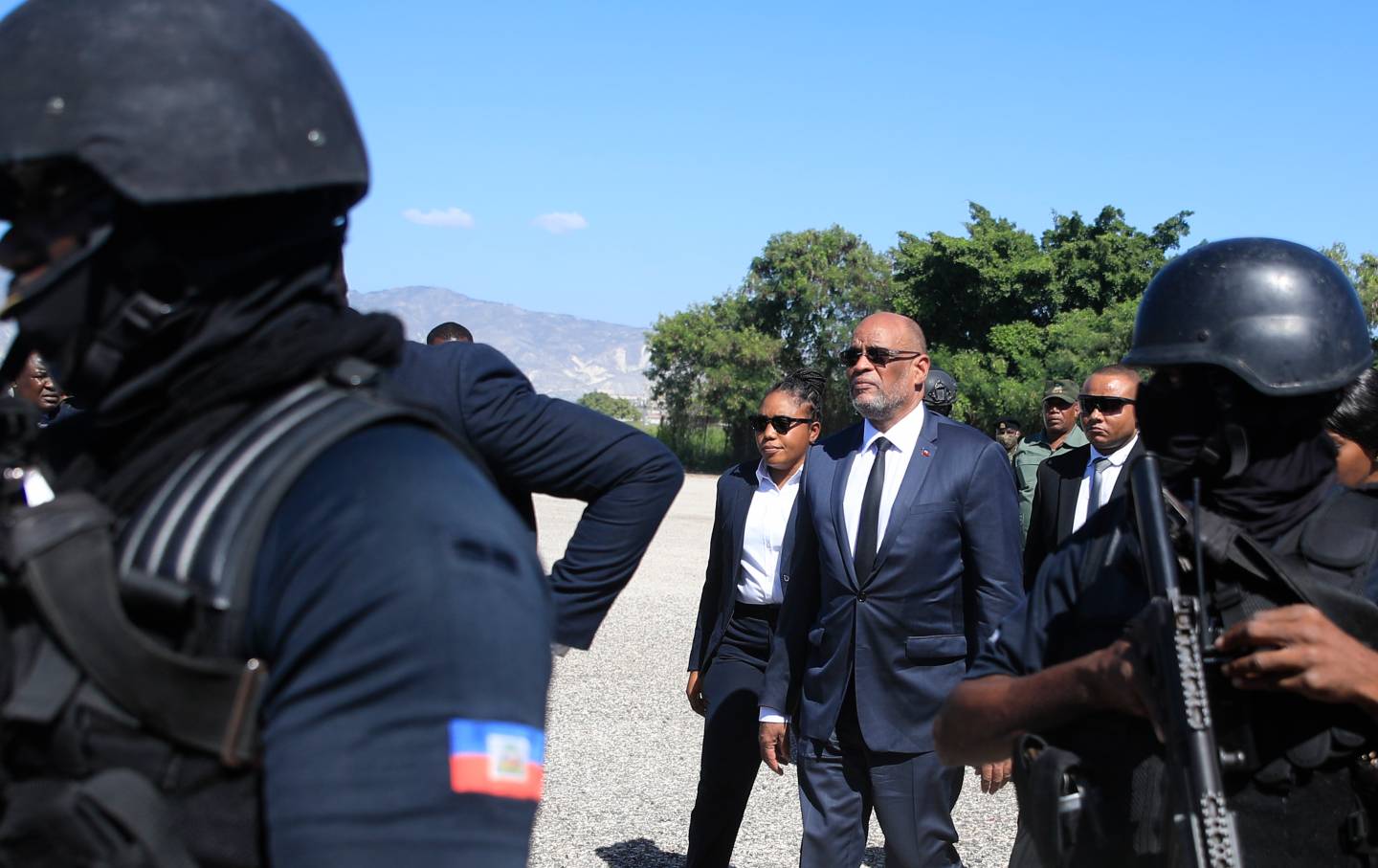
Haiti, April 2023: Soon There Will Be No One Left to Kidnap Haiti, April 2023: Soon There Will Be No One Left to Kidnap
The deadly consequences of the Biden administration’s policy of no policy.
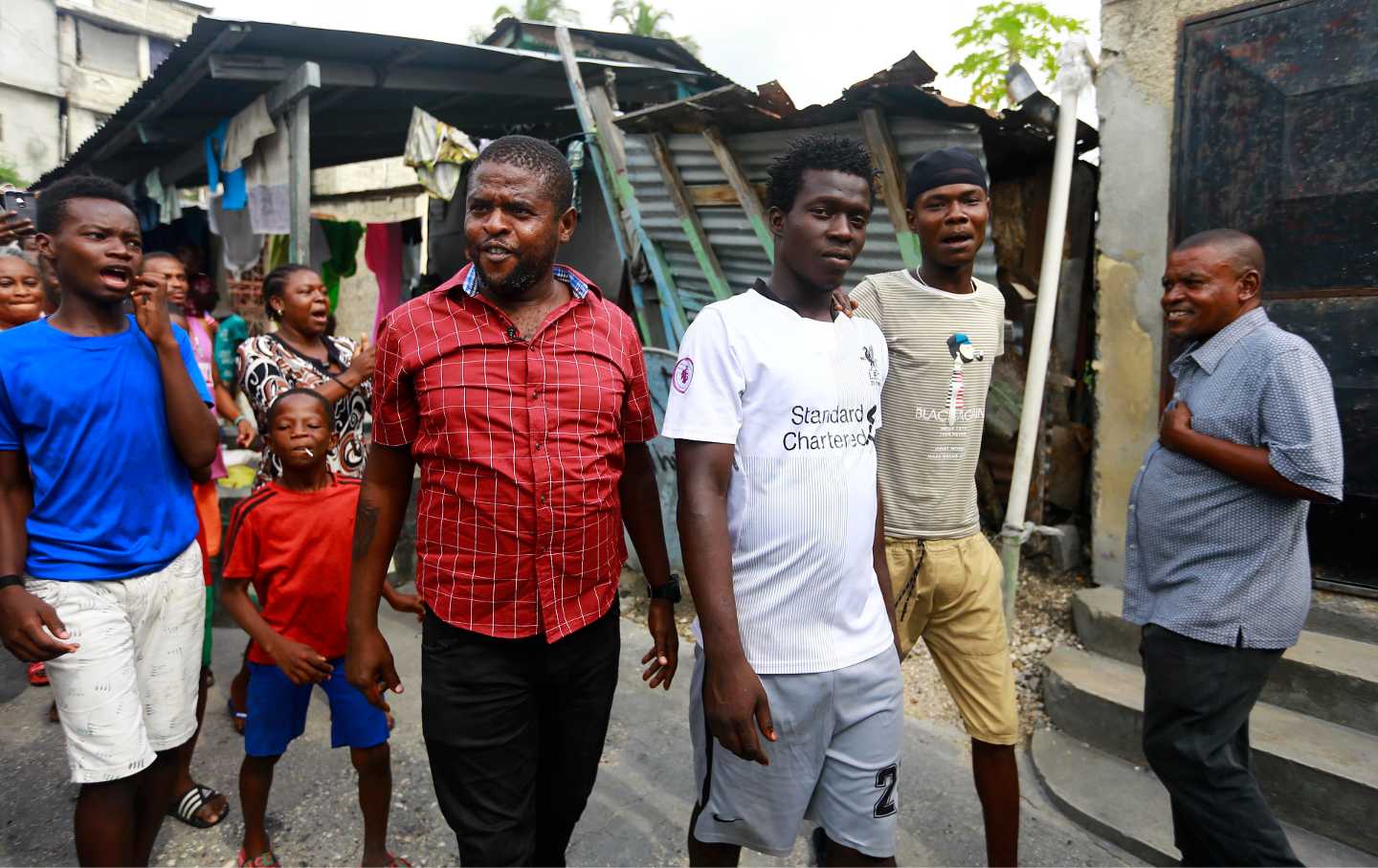
Will the Haitian Crisis Lead to Yet Another Military Intervention? Will the Haitian Crisis Lead to Yet Another Military Intervention?
With gangs holding the country hostage, and violence spinning out of control, the US and the UN play pass the parcel.


